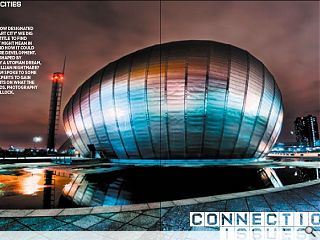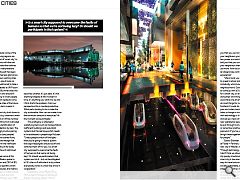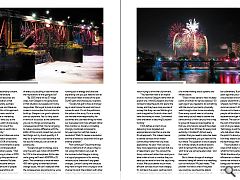Smart Cities
18 Apr 2013
With Glasgow designated the UK's latest ‘smart city’ we dig behind the title to find out what it might mean in practice and how it could shape future development. Is a world shaped by technology a utopian dream, or an Orwellian nightmare? Urban Realm spoke to some industry experts to gain their insights on what the future holds. Photography by David Pollock.
From Songdo to Masdar some of the world’s fastest growing regions are erecting a new breed of ‘smart city’ to provide their residents with the sort of technological nirvana that defines the more optimistic interpretations of the future. Less thought has been given to the altogether less glamorous role of patching up our existing cities however and in this area it looks as though Glasgow could be set to take a lead after it was selected as UK Future City Demonstartor. But what does this nebulous term mean and shouldn’t we really be investing in smart people instead? Urban Realm spoke to some of those building the cities of the future to find out what the term means in practice.Ultimately a smart city boils down to a better connected city, a network which can manifest itself in an infinite number of applications; anything from barcoded lampposts for easy identification of faults to rubbish collection by text. The future will increasingly involve pairing up real world objects (and people) with a vast behind the scenes flurry of information and knowledge that promises to transform the inefficient and impersonal reality of life today into a personalised hive of optimised environments.
To tease out what some of this might mean Urban Realm spoke to Don McLean, founder and CEO of IES, who is attempting to quantify smart cities by finding measures and metrics that can be employed to enable people to make rational, sensible and cost effective decisions. McLean said: “IBM and Accenture’s smart cities are about data. Nothing physical about the city becomes smarter, it’s just data. It’s not anything tangible at this moment in time, it’s anything you want it to be and I think that’s the problem. From our perspective this is counterproductive. What we’re looking to do is make the city sustainable. How can we make it use the minimum amount of resources? At the moment we’re profligate.”
This profligacy is reflected in wasteful systems such as transportation, inefficient buildings and redundant systems but the real issue which needs to be addressed is people says McLean: “Unless people switch off the lights then you’re going to need a system that says these lights should be off and switches them off for you. Is a smart city supposed to overcome the faults of humans so that we’re not being lazy? Or should we participate in that system and do it - but not be obligated to? It’s the sci-fi attitude of a city where everybody works in unison like a hive in cooperation.”
Speaking to Urban Realm Dave Fitch, project manager at Edinburgh Napier University, added: “One of the great examples of this (human psychology) is smart metering. If I told you that you use more power than your neighbours you’d probably use less power as a result. However, if I told you that you use less power than your neighbours then you’d probably use more. How do you use all of this to let citizens take control of their urban experience?
“Life is local; you want someone to speak to about pot holes. You want somebody who knows what goes on in a neighbourhood. Question is do you want to come up with a Scottish framework for a smart city, or do you get everyone doing their own thing? In theory you could have one smart card that could do most things for most people in Scotland. It could do your library, bus pass and video membership but that takes a change in mind-set. The problem with technology is it’s easy to go off and set up a new call centre or create a new website but people don’t want to be put through to another call centre or remember another username and password. If you’ve got something that brings these together it makes it easier for people.”
Gerard Evenden, senior partner at Foster + Partners, is involved in the new city of Masdar, Abh Dhabi. He said: “Though technology has a part to play, I don’t think we should think of a smart city purely in technological terms. A smart city is low energy, zero waste, easy to travel around, economically and socially sustainable, and planned in an integrated manner, which takes into account all of the different transport and energy systems that make up the whole. Most importantly, a smart city is a liveable city – if we don’t create urban spaces that people enjoy spending time in, then energy is a secondary concern, as such cities will never endure.
“Land and natural resources are both finite. The implication is that we will see higher density, perhaps higher-rise architecture, and there are environmental benefits in this approach – the worst case scenario would be urban sprawl. Masdar is interesting to look at in terms of land use, as the project has turned a patch of previously uninhabitable desert in one of the most extreme climates on earth into a sustainable community.”
A key driver of smart cities are some mind boggling population projections which anticipate that 50% of humanity will reside in urban environments as early as 2050 – when the world population will be at least nine billion people. “That means the people living in cities in 2050 will be approximately the population of the world just now”, remarks McLean. “We need to build the same amount of city for the same amount of people again which means everything will double in the next 40 years. If you think of every city doubling in size what are the implications of that going to be?
“By 2025 there will be 37 mega cities, now Glasgow‘s not going to be in that situation, but people can’t solve mega cities. We’ve got to look at smaller scales in communities first and start to build up. Glasgow is as good a place to start as anywhere. Yes it’s fairly stable in terms of its size but at the same time you can try things out and see the consequences of that. You’re not going to make a massive difference with the £24m of this current project but you can test things out, try it and quantify it. If they do it right this could become a real hot bed for what you can do with an existing city.
“Society has got to change, we’re only five parts per million off 400PPM for CO2 in the atmosphere. At the rate we’re going we’ll reach 450PPM in 25 years. The consensus is once we reach 450 we’re going to have real climate change issues. We can’t really tell what the consequences are going to be, we’re into science fiction there, but if we’re running out of energy and cities are expanding a lot you just need to look at all the doom laden movies of the past 30/40 years and choose your scenario.
“Society has got to have a stronger say in what moves forward and how it moves forward. It’s not the politicians, the police or the army. It’s as a society can we take more responsibility for ourselves and use these things to make our lives easier and more efficient rather than monitor us. Society is incredibly strongly monitored compared to ten years ago but will that cause a revolution? Well if it causes a revolution and we all leave our cities then we’ve got another problem.”
Fitch continued “One of the things that is a hallmark of UK cities is they’re not using information very well. At the moment what Glasgow is doing is a logical progression of its existing infrastructure, there aren’t any great changes. London’s doing well because they have a mayor who is trying to drive change forward; the problem with other cities is they don’t have someone with a vision trying to drive the city forward.
“You feel that there is an implicit drive to improve Glasgow rather than an explicit one. I think Europeans are more inclined to take the punt and spend the money and they have more sources of money that they can use. Edinburgh is cash strapped but Scottish cities don’t have the money to invest, Continental cities are better at securing European funding.”
Fitch defines a smart city as delivering more targeted and appropriate services than a one size fits all approach. This makes it easier to deliver services which match communities rather than city wide approaches. He said: “How can you have more responsive services that are of relevance to you? You can put the library online and rather than send you a letter when a book is overdue they can send you an email or text that says bring it back. We could deliver much more efficient services much more cheaply. It’s not like in five years, we’ll be smart. It’ll take a lot longer, more money and a lot more thinking about systems and infrastructure.
“Does it make sense to have multiple points of contact for service delivery? 50 years ago if you needed to do something with the council you had to physically walk through a door to see somebody. Does every council need a call centre, does every council need to deliver the same service, or how can you find a way to group all these services together so that you only have to reinvent the wheel once rather than 32 times for every local authority in Scotland? Almost every problem that you need to solve has been solved somewhere, you just need to find out where. The question is lots of people for a whole variety of political reasons want to reinvent the wheel they don’t want to re-use someone else’s idea - and that costs.”
But is there a danger of analogue residents being left behind in a headlong rush to the future? McLean notes: “The problem we have is that in five years you could say we should be able to do x,y and z but in five years that will be rudimentary. If you had said five years ago that you’d see a phone with a touchscreen and do all sorts of stuff people would think you were crazy, whereas now that’s just completely common sense. In 20 years’ time you can choose not to have a phone but other people will be able to customise their experience and get things which are relevant. The cost of these things isn’t the cost of the handset it’s the political cost of do you release the data or not. Technology is just the enabler. People who talk about cities are really missing the point it’s about people in cities and how they relate to each other rather than the technology that intermediates.”
The implication of the term ‘smart’ cities is that today’s cities are dumb but, whilst far from perfect, they do work. Whilst the allure of pursuing greater efficiencies is inherently appealing it comes not without associated risks. That being said the reward of a better future is too great to ignore and as the growth of cities the world over accelerate further that change is all but inevitable.
|
|
Read next: Edinburgh Colonies
Read previous: Commonwealth Games Athletes Village
Back to April 2013
Browse Features Archive
Search
News
For more news from the industry visit our News section.
Features & Reports
For more information from the industry visit our Features & Reports section.





